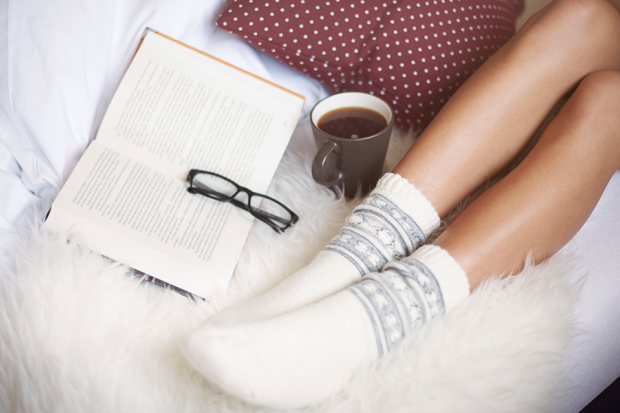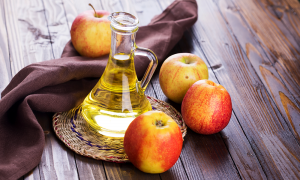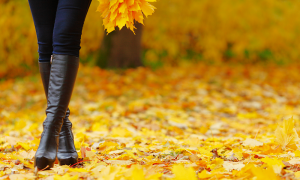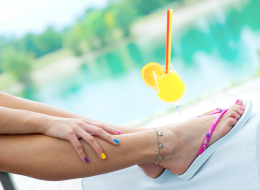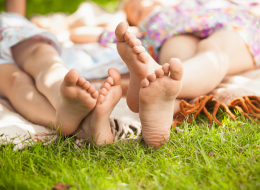Fall Foot Care Why Autumn Is A Crucial Time To Love Your Feet
Don’t let boot season fool you: Fall is one of the most important times to shower your feet with TLC, pedicures and beautifying foot care.
Summer is over and your feet will now be hidden away in fall socks and boots for the next several months, but contrary to popular belief, now is not the time to take a break on regular foot care. In fact, foot experts say fall foot care is one of the most crucial steps to keeping your feet healthy and beautiful. Don’t believe us? Then maybe podiatrist Margaret Dabbs, the so-called “Queen of Feet”, can change your mind.
The London-based foot doctor is one of the most well-known podiatrists on the planet, and she’s of the opinion that caring for your feet in the fall might be just as important — if not more so — than caring for your feet in the summer. The reason? Your feet have just survived a sweltering summer in flip flops and sandals, and suddenly wrapping them in closed toe shoes (like those gorgeous fall boots you just bought) comes at a cost.
“Feet can leave the summer months feeling extremely dehydrated," Dabbs told The National. "Fall is an important time to really focus on them, and get them back into tip-top condition for the autumn and winter seasons, when they will be hidden in closed footwear, which will exacerbate any skin conditions that may already exist."
How To Care For Your Feet In The Fall
You might think that spring and summer are all about the pedicures, but Dabbs actually recommends people step up their foot care pampering in the autumn. “Women should go for a pedicure twice a month,” she insists, adding that they should also use foot lotion on a daily basis to help maintain the health and elasticity of the skin.
But regular pedicures and daily moisture aren't the only important steps to proper fall foot care. Here are some other autumn foot care routines she and other experts maintain will keep your feet healthy, beautiful and strong through pumpkin season and beyond:
- Take a nail polish break. In the fall, your toenails aren’t constantly on display in flip flops and sandals like they are in the summer. And Dabbs warns that regularly polishing the nails is unhealthy anyway. "The nails can deteriorate as a result of persistent nail color, so it is a good time to go polish-free or wear a lighter shade of polish, which is less hard on the nail as the pigment will be less intense,” she recommends.
- Exfoliate: Slough your feet with a foot file at least once per week — but only on dry skin. “Once the feet are wet, firstly it masks the area to be treated. Secondly, the skin becomes rubbery and so does not exfoliate so well and the foot file will not adhere to wet skin in the same way,” Dabbs says. “Also, if you are prone to cracks in the skin, if you bathe the feet first, the cracks are more likely to open as the water weakens the tissues.”
- Treat yourself to warming foot soaks. Not only will the heated water help soothe and relax chilly autumn feet, foot soaks help decrease stress and can make you look and feel years younger. For more about the benefits of footbaths, click here.
- Choose the right fall boots and other types of footwear. Surprising fact: They actually shouldn’t be flats. "If you get yourself a pair of shoes with a thicker heel, not too high and not too flat, with some straps to look girlie but with good support, there is the answer,” the podiatrist shares. “They really do not have to be frumpy. But beware of pain — it is there for a reason.”
- Use the above fall foot care tips year round. The combination will help ward off aging feet, calluses and corns that come along with growing older. “Women suffer from very dry skin on the feet, especially as they undergo hormonal changes, and thin skin and calluses and hard-skin build-up are a result of this,” Dabbs says of how the feet change as a person ages. “The skin thins and becomes paper-fine, the subcutaneous fat is lost, the sweat glands reduce in effectiveness, and the soft tissues or plantar fascia become lax, which is when you get gait-related secondary skin disturbances such as hard skin on the ball of the feet or beside the big toe or on the heels.”
Notice concerning medical entries:
Articles having medical content shall serve exclusively for the purpose of general information. Such articles are not suitable for any (self-) diagnosis and treatment of individual illnesses and medical indications. In particular, they cannot substitute for the examination, advice, or treatment by a licensed physician or pharmacist. No replies to any individual questions shall be effected through the articles.

